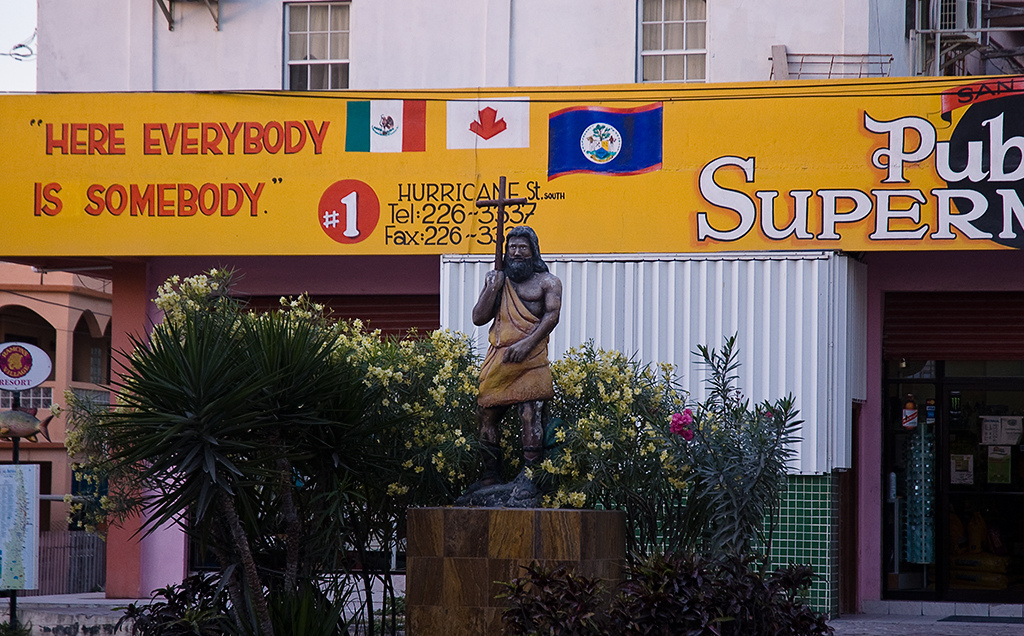
Photo © Dennis Redfield, licensed Creative Commons Attribution.
Belize’s history has led to a unique, multicultural population where each culture depends on the other in ways rarely seen in other parts of the world. No particular group has been totally self-sufficient. In the days of the early settlements, the different groups of people came together in order to defend against attempted invasions, such as the Battle of St. George’s Caye. There are about 46,000 foreigners who have made Belize their home, including Americans, Canadians, Europeans, Chinese, Jamaicans, Central Americans, and others.Mestizos, people of Spanish and Maya descent, make up almost half the population of Belize. A quarter of the population is made up of Creoles, who have European and African ancestry. There are also three tribes of Maya Indians and a population of the Garifuna people, who have Carib Indian and African heritage.There are about 46,000 foreigners who have made Belize their home, including Americans, Canadians, Europeans, Chinese, Jamaicans, Central Americans, and others. According to the Statistical Institute of Belize’s (SIB) 2010 Housing and Population census, there are 27,000 Central Americans, primarily from Guatemala as well as El Salvador and Honduras, in Belize. There are East Indian, Filipino, Chinese, Lebanese communities, and traditional and progressive Mennonite groups.
Don’t be surprised or insulted by phrases and terms used to describe ethnic groups that would be considered politically incorrect in the West: white people are commonly known as “gringos” or “white man”; people with Chinese heritage are known as “China man”; and black people of African descent are generally referred to as “black man.”
One of the best examples of multiculturalism in Belize can be found in the music played on local buses. It’s never the same. It varies between Western pop, Spanish music, reggae, hip hop, punta rock, brukdown, marimba, and everything in between.
Generally speaking, people tend to socialize within their own distinct group, but there is a lot of exposure to and interaction among the different groups. For example, when you shop, you’ll wander from a fruit stall, often run by a Mestizo, to the butcher, who can be Belizean or in my case Zimbabwean, to the baker, mine is a French bakery run by a German, and the general supermarket, usually run by Chinese. You’ll get to know the different stores and chat with the stall owners.
While there is some intermarriage and there are friendships outside of one’s group (mostly among those with higher education levels), this is not the rule. These barriers of separation are somewhat broken down by the younger generations of Belizeans who attend school together, where socializing is not limited to nationality or race.
There is a busy, social expat scene here, but whether you engage in it depends on you. There are also various opportunities to get to know people through the market and volunteer work.
In general, Belizeans value respecting others, being polite, and treating others as you would like to be treated. People here take time to speak to each other. Children and the elderly are respected and looked after. On local buses, the ticket collectors will always help lift small children off buses, offer a hand to the elderly, or help carry shopping bags.
How Belizeans react to foreigners in their midst depends on the individual Belizean and on the foreigner. If you are polite, considerate, and willing to listen and learn about local customs and ways of approaching problems, you will be accepted and treated fairly. On the other hand, if you arrive with an attitude that, because you come from a developed nation, you think you know how to do things better than Belizeans, you may encounter resentment and coolness. Friendliness goes a long way; introduce yourself, and people will most likely chat and share experiences. You will encounter smiles and waves to greet you, even from total strangers. Ask advice, and interesting conversations ensue; everyone has a story to tell.
In general, Belizeans are welcoming to foreigners, and both locals and expats view their encounters as an opportunity to learn from one another and forge new relationships.Upon first encounters, some Belizeans may be hesitant to accept foreigners as friends or as part of an extended family. The economic divide between the majority of the local population and foreigners from North America and Europe cannot be denied and informs many interactions between foreigners and some Belizeans. Many Belizeans aspire to move to the United States, but immigration laws and financial barriers make it difficult or impossible. And although Belizeans take great pride in their home country, many are poor by Western standards and may not understand why an American would want to move here. Additionally, there is an assumption that if someone has the money to move here, they must be wealthy. With this assumption comes the idea that foreigners should be lending a (financial) helping hand to people here. Sometimes you may find a gringo price (more expensive) and a Belizean price (a lot cheaper) for the same item or service. The reality is that foreigners generally do have more money than most Belizeans, so it’s wise pay a price that is fair to both parties.
There is also a problem with theft in Belize. The unemployment rate is 23 percent, and in 2010 the average Belizean’s salary was BZ$850 per month. Many Belizeans live a hand-to-mouth existence in simple wooden structures without luxuries such as electricity and vehicles. Therefore, stealing from those who have more becomes an appealing option for some.
In general, Belizeans are welcoming to foreigners, and both locals and expats view their encounters as an opportunity to learn from one another and forge new relationships.
Excerpted from the Second Edition of Moon Living Abroad in Belize.